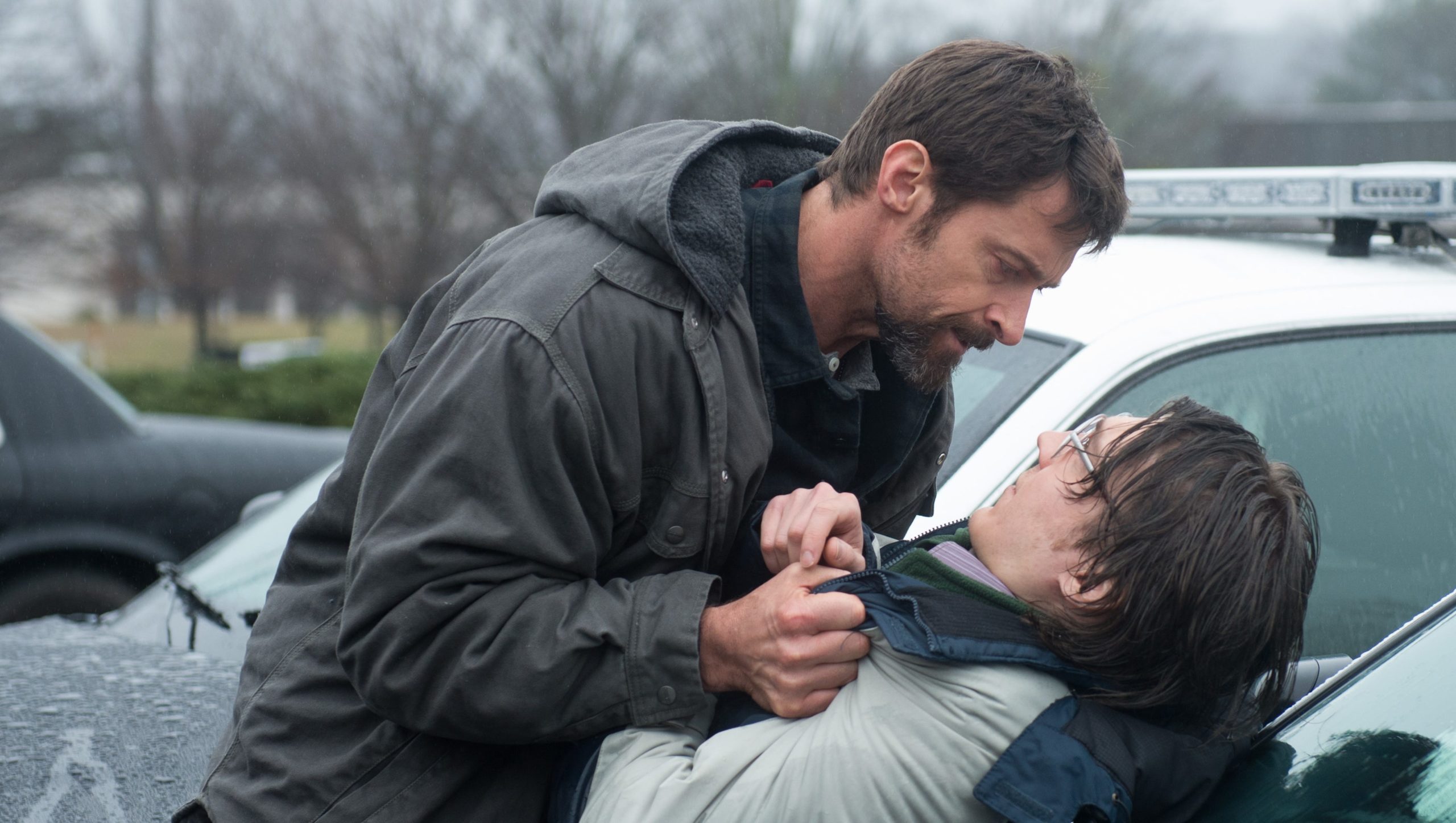Prisoners is a child abduction drama with a crusading conviction all but gone from the modern Hollywood thriller. I’m not sure that alone marks it for greatness as some recent Telluride notices were quick to coronate—but it is certainly a bluntly effective tool. Directed by Quebecois filmmaker Denis Villenueve (Oscar-nominated for 2011’s Incendies and here helming his first Hollywood outing) Prisoners takes genre material and elevates it to a crime and punishment ethics thesis, plunging us down the darkest of rabbit-holes to a place where our identification with the vigilante tactics of a stricken father hunting for a missing daughter is unavoidable—courtesy of star Hugh Jackman—and we are made accomplices.
With a twisty, take-its-time screenplay by Aaron Guzikowski (Contraband), set in a working class Pennsylvania suburb, a pair of middle class families, the Dovers (Hugh Jackman, Mario Bello) and the Birchs (Terrence Howard, Viola Davis), gather to celebrate Thanksgiving with their teens (Dylan Minnette, Zoe Borde) and ten-year-old daughters (Erin Gerasimovich, Kyla Drew Simmons).
The afternoon wears on, as holiday afternoons do, and the young girls disappear outside to play. And then disappear. The frantic parents turn up no trace, but when prime suspect Alex Jones (Paul Dano), the owner of a mysterious, ramshackle RV, is held for questioning and then released, Keller Dover (Jackman)—a staunch Catholic who recites the Lord’s Prayer while deer hunting in the opening scene—takes matters into his own hands.
While dogged Detective Loki (Jake Gyllenhaal) turns every stone, impatient Dover kidnaps the mentally-challenged Jones, imprisoning him in a run-down, abandoned apartment building, doling out escalating physical and psychological abuse in an attempt to extract the girls’ whereabouts. While his own wife is nearly catatonic, he confides his scheme in the Birchs, shocked but reluctantly complicit.
Days pass and the investigation goes cold with a methodical unspooling of red herrings and a cabal of creepy supporting characters that spring from the woodwork, including Melissa Leo as Jones’ homespun aunt and the marvelous David Dastmalchian who seems like a pretty good bet… Well, to say more wouldn’t be fair to the impressive intricacies of the screenplay, a better thriller than morality play (and really, Jackman’s torturing isn’t as provocative as the film thinks).
The crux here is the what would you do proposition, cannily inviting our sympathies for Jones (after all, there is no real evidence linking him to the disapperance) while keeping us rooted in Keller’s brute force agenda. This is largely due to Jackman’s single-minded intensity in the role.
Prisoners basically says that there are things in life that an ordinary, otherwise “good” person will kill for; that the slaughter of innocence and eradication of family justifies the summoning and execution of primal revenge; and that, as we learned in Zero Dark Thirty, there just may be something to this torture thing (though both persecutor and victim walk through hell, together). Prisoners, indeed.
Yet as fascinating as this sounds and sometimes plays, there’s something vaguely familiar here in the rain-slicked, blue collar milieu, something slightly calculated about the lying down with very dirty dogs tactics, and something Zodiac-familiar in the investigation with no apparent end game, led by a cop who Takes It Very Personally, all analogous echoes of Gone Baby Gone, Seven and even Mystic River.
Good as the ensemble is, there’s also a slightly missed opportunity to fully depict the psychological impact on the families (Bello can’t get out of bed and pops pills, Davis wanders through candlelight vigils and Howard tears up a lot), both wives sidelined by the sleuthing despite a terrific scene where a desperate Davis makes a critical judgment error while trying to coax details from their captive.
An unproduced Hollywood screenplay that languished for years and was initially a vehicle for producer Mark Wahlberg (in the Jackman role) and Christian Bale, Prisoners‘ core is genre—kidnap, revenge, hellbent cop—but this 153-minute movie probes its characters, their actions and consequences with microscopic precision. The subject matter is pitch, which may keep some viewers away, but the treatment steers clear of sensationalism, instead paying serious mind to the emotional tolls of the disappearance, with each of the characters, including Loki, handling the crisis differently.
While Keller’s parental quagmire renders him most accessible, Loki emerges at least as driven and perhaps more complicated. As played by Gyllenhaal—dependable as always and performing with a dug-in focus and physical command much like his strong work in last year’s End of Watch—Loki is another of Prisoners’ prisoners, a pent-up loner and former foster child on a mission of redemption, a single line of dialogue alluding to his own childhood innocence lost.
3 1/2 stars.



